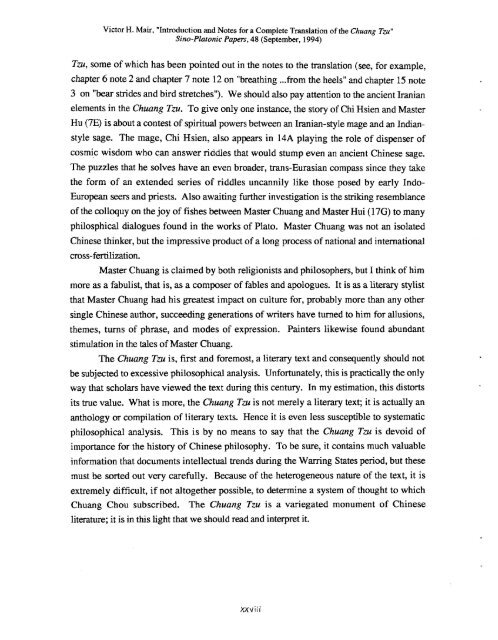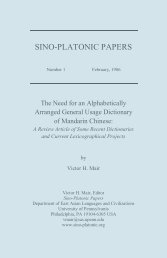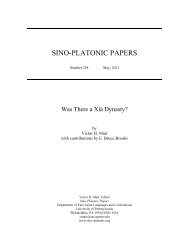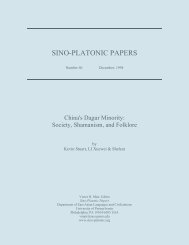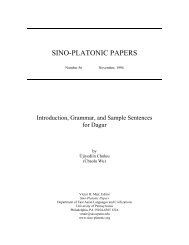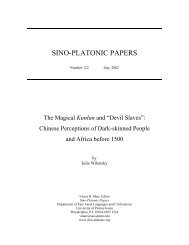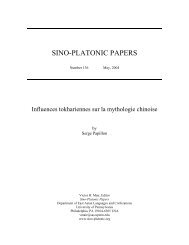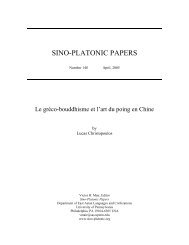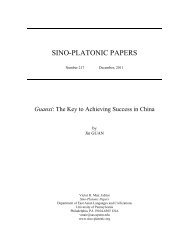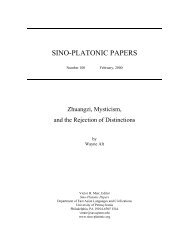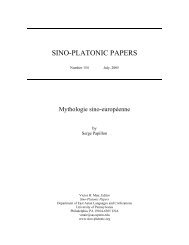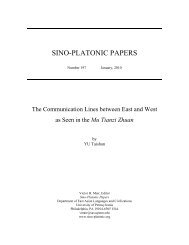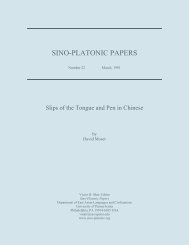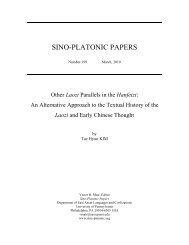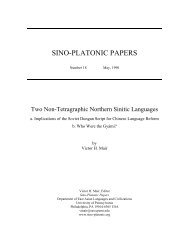Introduction and Notes for a Complete Translation of the Chuang Tzu
Introduction and Notes for a Complete Translation of the Chuang Tzu
Introduction and Notes for a Complete Translation of the Chuang Tzu
Create successful ePaper yourself
Turn your PDF publications into a flip-book with our unique Google optimized e-Paper software.
Victor H. Mair, "<strong>Introduction</strong> <strong>and</strong> <strong>Notes</strong> <strong>for</strong> a <strong>Complete</strong> <strong>Translation</strong> <strong>of</strong> <strong>the</strong> <strong>Chuang</strong> <strong>Tzu</strong>"<br />
Sino-PZutonic Papers, 48 (September, 1994)<br />
<strong>Tzu</strong>, some <strong>of</strong> which has been pointed out in <strong>the</strong> notes to <strong>the</strong> translation (see, <strong>for</strong> example,<br />
chapter 6 note 2 <strong>and</strong> chapter 7 note 12 on "breathing ... from <strong>the</strong> heels" <strong>and</strong> chapter 15 note<br />
3 on "bear strides <strong>and</strong> bird stretches"). We should also pay attention to <strong>the</strong> ancient Iranian<br />
elements in <strong>the</strong> <strong>Chuang</strong> <strong>Tzu</strong>. To give only one instance, <strong>the</strong> story <strong>of</strong> Chi Hsien <strong>and</strong> Master<br />
Hu (7E) is about a contest <strong>of</strong> spiritual powers between an Iranian-style mage <strong>and</strong> an Indian-<br />
style sage. The mage, Chi Hsien, also appears in 14A playing <strong>the</strong> role <strong>of</strong> dispenser <strong>of</strong><br />
cosmic wisdom who c.an answer riddles that would stump even an ancient Chinese sage.<br />
The puzzles that he solves have an even broader, trans-Eurasian compass since <strong>the</strong>y take<br />
<strong>the</strong> <strong>for</strong>m <strong>of</strong> an extended series <strong>of</strong> riddles uncannily like those posed by early Indo-<br />
European seers <strong>and</strong> priests. Also awaiting fur<strong>the</strong>r investigation is <strong>the</strong> striking resemblance<br />
<strong>of</strong> <strong>the</strong> colloquy on <strong>the</strong> joy <strong>of</strong> fishes between Master <strong>Chuang</strong> <strong>and</strong> Master Hui (17G) to many<br />
philosphical dialogues found in <strong>the</strong> works <strong>of</strong> Plato. Master <strong>Chuang</strong> was not an isolated<br />
Chinese thinker, but <strong>the</strong> impressive product <strong>of</strong> a long process <strong>of</strong> national <strong>and</strong> international<br />
cross-fertilization.<br />
Master <strong>Chuang</strong> is claimed by both religionists <strong>and</strong> philosophers, but I think <strong>of</strong> him<br />
more as a fabulist, that is, as a composer <strong>of</strong> fables <strong>and</strong> apologues. It is as a literary stylist<br />
that Master <strong>Chuang</strong> had his greatest impact on culture <strong>for</strong>, probably more than any o<strong>the</strong>r<br />
single Chinese author, succeeding generations <strong>of</strong> writers have turned to him <strong>for</strong> allusions,<br />
<strong>the</strong>mes, turns <strong>of</strong> phrase, <strong>and</strong> modes <strong>of</strong> expression. Painters likewise found abundant<br />
stimulation in <strong>the</strong> tales <strong>of</strong> Master <strong>Chuang</strong>.<br />
The <strong>Chuang</strong> Tm is, fist <strong>and</strong> <strong>for</strong>emost, a literary text <strong>and</strong> consequently should not<br />
be subjected to excessive philosophical analysis. Un<strong>for</strong>tunately, this is practically <strong>the</strong> only<br />
way that scholars have viewed <strong>the</strong> text during this century. In my estimation, this distorts<br />
its true value. What is more, <strong>the</strong> Chwng <strong>Tzu</strong> is not merely a literary text; it is actually an<br />
anthology or compilation <strong>of</strong> literary texts. Hence it is even less susceptible to systematic<br />
philosophical analysis. This is by no means to say that <strong>the</strong> Chwng Tw is devoid <strong>of</strong><br />
importance <strong>for</strong> <strong>the</strong> history <strong>of</strong> Chinese philosophy. To be sure, it contains much valuable<br />
in<strong>for</strong>mation that documents intellectual trends during <strong>the</strong> Warring States period, but <strong>the</strong>se<br />
must be sorted out very carefully. Because <strong>of</strong> <strong>the</strong> heterogeneous nature <strong>of</strong> <strong>the</strong> text, it is<br />
extremely difficult, if not altoge<strong>the</strong>r possible, to determine a system <strong>of</strong> thought to which<br />
<strong>Chuang</strong> Chou subscribed. The <strong>Chuang</strong> <strong>Tzu</strong> is a variegated monument <strong>of</strong> Chinese<br />
literature; it is in this light that we should read <strong>and</strong> interpret it.


